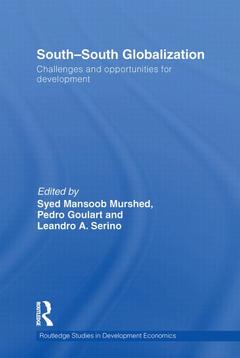Description
South-South Globalization
Challenges and Opportunities for Development
Routledge Studies in Development Economics Series
Coordinators: Murshed S. Mansoob, Goulart Pedro, Serino Leandro
Language: English
Subjects for South-South Globalization:
Keywords
Pe Rc; imbalances; South South Globalization; developing; Global Imbalances; country; World Gdp; low; Gdp Growth; income; Global Financial Imbalances; countries; World Gdp Growth; middle; Ha Ng; financial; Ta Te; high; Labor Intensity; exchange; Private Capital Flows; Ta Ge; Capital Flows; Export Promotion Agencies; Bretton Woods II; IMF Member; Recursive Residuals; Market Size Effect; Pr Ic; Primary Commodity Prices; Ti Ti; Civil Society; Cumulative Gdp; Sh Ar; Cm Analysis
Publication date: 11-2013
Support: Print on demand
Publication date: 06-2011
· 15.6x23.4 cm · Hardback
Description
/li>Contents
/li>Readership
/li>Biography
/li>
Two prominent features of the current global economy are the world-wide recession brought about by the recent financial crisis, and the emergence of major economic powers from within the developing world such as Brazil, China and India. The former represents the failure of global regulatory policies and macroeconomic imbalances between surplus and deficit countries; the latter is symptomatic of a partial shift in economic power towards developing nations, who are often collectively labelled the global South.
The macroeconomic imbalances are unsustainable in the longer run as they mean greater absorption relative to income in deficit nations; they require corrective action and international policy coordination. Reducing imbalances also requires large developing countries to raise their domestic consumption and also imports from the rest of the world and international financial institutions to operate as a lender of last resort. Furthermore, the engines of global growth, especially for developing countries, may no longer lie solely in the traditional developed country markets in the USA, Europe and Japan, known collectively as the global North. Rather South-South trade is growing rapidly, and that could be an engine of growth for the global economy, including both developed and developing countries. The various chapters in this edited volume address issues surrounding global imbalances and the prospects for growth in developing countries propelled by South-South interaction.
This book should be of interest to students and researchers focussing on political economics, international economics, globalization, global imbalance and the world-wide recession after 2008.
Part 1: Trends in Globalization 1. Globalization and the South at the Crossroads of Change S. Mansoob Murshed, Pedro Goulart and Leandro A. Serino 2. New Directions for Globalization in Times of Crisis Rob Vos 3. Global Imbalances, Financial Crisis and Globalization Rudiger von Arnim 4. Global Imbalances and the US Crisis: Is a Bad Excuse Really Better than None? Kunibert Raffer 5. Employment in the South Rolph van der Hoeven and Malte LübkerPart 2: Engines of Growth in the South 6. The Asymmetry of North-South Regional Trade Agreements Parthapratim Pal 7. The Multi Fibre Arrangement and South Asia Saibal Kar 8. The Geography of Trade and the Network Effects of Economic Diplomacy in the South Marie-Lise van Veenstra, Mina Yakop and Peter A.G. van Bergeijk 9. Value Chain Responsibility in the Global South Peter Knorringa 10. The Diverse Dynamics of Deindustrialisation Internationally Fiona TregennaPart 3: Country Case Studies 11. The ‘Dragon’ and the ‘Elephant’ and Global Imbalances Max Spoor 12. Trade Integration After the Great Recession: The Case of Argentina Leandro A. Serino 13. The Macroeconomics of Remittances: The Case of the Philippines Veronica Bayangos and Karel Jansen 14. Regional Integration and South-South Trade Expansion: The Case of Senegal in WAEMU Diadie Diaw and Tran Thi Anh-Dao
Syed Mansoob Murshed is Professor of the Economics of Conflict and Peace at the Institute of Social Studies, the Netherlands, and is also Professor of International Economics at the University of Birmingham, UK.
Pedro Goulart is a PhD student at the Institute of Social Studies, the Netherlands.
Leandro A. Serino is Researcher and Assistant Professor of Economics at the Institute of Sciences, University of General Sarmiento, Argentina.




